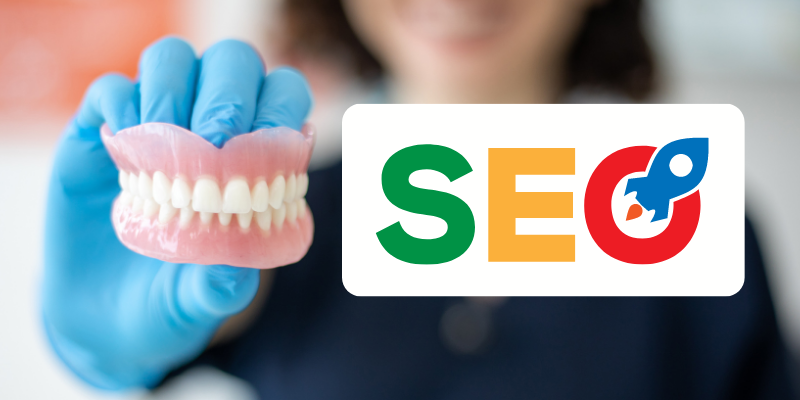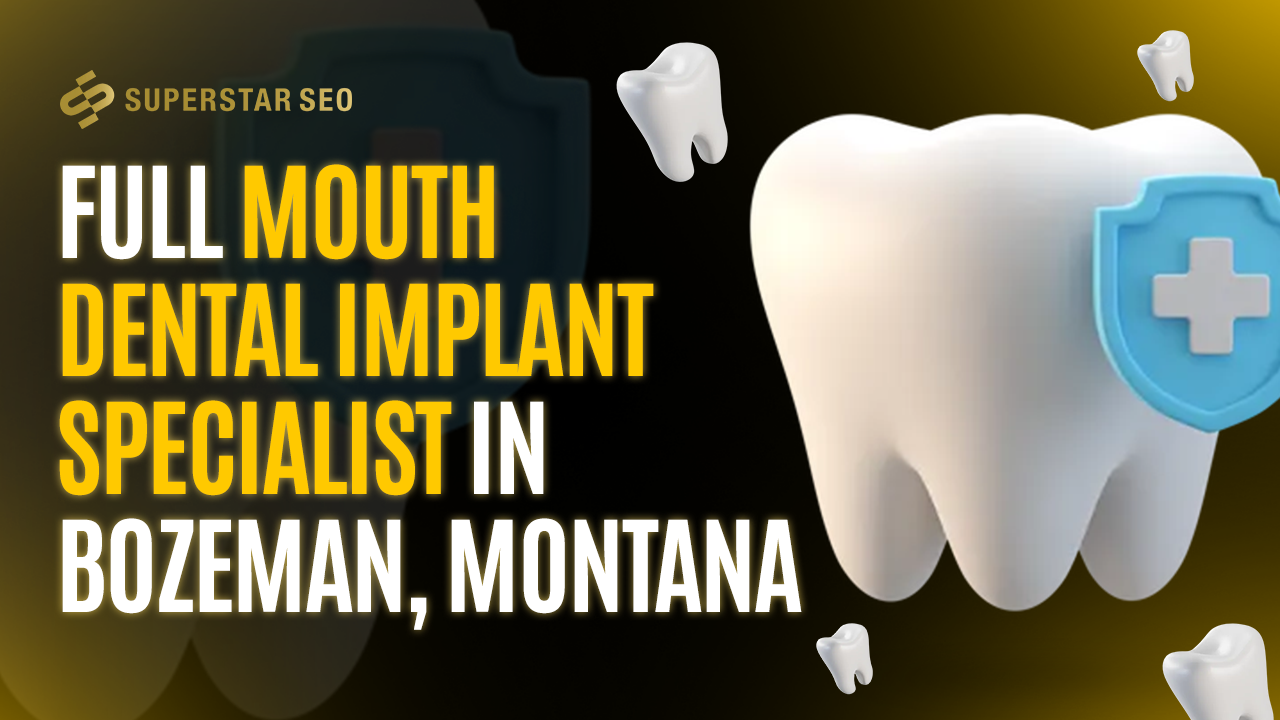Full Mouth Dental Implant Specialist in Bozeman, Montana
Not getting enough dental clients through search engines? The dental hygiene programs must have improved, right? Wrong.
It’s because your dental website isn’t as optimized as your competitors.
Unfortunately for you, they’re ranking higher on Google, stealing most of the traffic.
If you want to attract organic leads, the only solution is to improve your dental SEO strategy.
In this guide, we’ll talk about:
What’s dental SEO and Why’s it important
How should you do it
A perfect example
Let’s start with what.
What’s Dental SEO
Dental search engine optimization (SEO) refers to optimizing your website so that it appears at the top of Google for relevant search queries like:
Dentists near me
Dental Office
Dental implants in “Country”
Optimizing your service pages lets you steal your competitors’ patients ethically.
Their significance in SEO lies within their prominent presence on search engine results pages (SERPs), exerting a pivotal influence on click-through rates. By meticulously optimizing them with relevant keywords, and enhancing the appeal of a dental practice’s website to search engines, a surge in online visibility ensues, drawing in a stream of organic traffic.
Importance of Dental SEO Services
Higher Trust
People trust web pages that rank at the top of Google’s first page.
This does not mean that the dental services that are ranked below are inferior.
It’s just that businesses that rank high don’t take their SEO lightly.
More Traffic
The higher you rank on a search engine like Google, the more traffic you get from it.
And when more people land on your site, you have more opportunities to convert website visitors into customers.
Competitors are Doing It
If, for some reason, you decide not to invest in dental website SEO, it’d be an opportunity for your competitor.
All in all, if your goal is to run a local dental service successfully, SEO should be at the top of your priorities.
With that said, let’s see how you can go about optimizing your dental business for higher Google rankings.
SEO for Dental Businesses
Local Search Engine Optimization
Local SEO lets you gain more traffic from your locality.
More than 70% of patients looking for dental professionals turn to Google local searches.
Here’s how you can get a big chunk of that traffic to your dental service.
Optimizing Google My Business Page
Adding your business details to Google My Business is a crucial initial step in local SEO.
Search the keyword “Dentists near me” and you’ll see all GMB results at the top.
These three search results are also known as Google Map Pack.
Your dental practices business can get one of these spots with an optimized Google Business profile.
Note how easy it is for someone to contact one of these businesses right from the Google search page.
Here’s how you create and optimize a GMB profile:
Claim your business
Add your working hours/days, address, phone number, and physical address
Add a business description with real images
Get positive customer reviews
Add Your Business to Local Directories
Your target audience may be looking for services like yours in local business directories.
Adding your information to all the top online business directories will maximize your local reach.
To maintain consistency, make sure your business information stays the same across all these platforms.

On-Site Optimization
On-site SEO is when you optimize the content on your web pages for maximum search engine exposure.
It’s important to understand how Google and other search engines crawl and index a website.
The type of content you publish on your site tells these search bots what category to put your site in.
When you post content on dental topics only, you’re showing authority in that niche.
In addition to relevance, there are several important on-site SEO factors to implement.
Keyword Research
One of the first things you want to do is find popular local search terms around your service.
To find these local search terms, use the free Google Keyword Planner.
Enter your main query in the search bar after selecting your exact physical location.
It’ll give you a list of related search terms you can work on.
Optimize for Intent
Optimize every page on your website for the searcher’s intent.
Whenever Google tries to rank web pages for a query, it looks for the intent of the user.
For instance, it’ll categorize your dental website’s service pages under the buying or purchase intent.
On the other hand, it’ll put blog posts under the informational intent category.
This means anyone looking for information related to dental procedures will see blog posts.
Whereas, anyone interested in a dental consultation or implant will see relevant service pages.
To optimize your web pages for the searcher’s intent, optimize the following elements on them:
Titles
Meta titles
Meta descriptions
Content
ALT text of images
Navigation
Establish E.E.A.T
Gone are the days when anyone could advise the general public on any topic.
Today, if you’re in any YMYL (Your Money, Your Life) niche, Google will test your authority before ranking you.
It includes every topic that affects someone’s:
Health
Wellness
Financial security
And life
To rank for topics under any of those categories, you need to build your authority first.
Following Google’s E.E.A.T (Experience, Expertise, Authoritativeness, Trustworthiness) guidelines is the way to do that.
Here’s how you can build E.E.A.T:
Add an author bio with all the details that position you as an authority in your industry
Create a “Teams” page with all the people behind your dental service
Write a detailed “About Us” page
Add your rewards
Ensuring User-Friendliness
Google wants to deliver the best experience to its users.
This means making a web page bot-friendly isn’t going to cut it anymore.
You need to make sure your dental website is user-friendly in every aspect.
Thanks to Google’s Natural Language Processing, its search bots can now understand the content on a web page word by word.
This means the quality, relevance, and intent of your content need to be right on point.
Otherwise, you’ll end up ranking below your competitors.
Off-Site Optimization
Off-site dental SEO marketing is all about working on factors that don’t directly apply to your website.
These factors tell Google that your website is worth ranking.
Search engine crawlers continuously look for any links pointing to your site.
Reviews from related websites on the internet are an important off-page signal.
However, only high-quality, relevant links make your site a trustworthy resource, boosting its authority and rankings.
This is because Google treats these links as votes of confidence from website owners.
As a dental professional, you want a maximum of these website owners to link to your service.
Let’s talk about some effective ways to acquire backlinks to your dental website.
Backlink Outreach
Probably the best way to build links to dental websites are by doing outreach.
Backlink outreach is when you reach out to a website owner asking them for a link to your site.
These links need to be from medical, health, and wellness websites.
Plus, realize that no one is going to link to your site unless there’s something for them.
A word of caution though. Don’t buy links, or exchange anything for links.
It’s against Google’s guidelines, so you could end up getting a penalty.
Instead, offer a super-high-value piece of content in your outreach email.
This is why guest posts work so well as an off-page SEO strategies.
Guest posts are written pieces that you publish on other websites with a link to yours.
Combine effective outreach with high-quality guest posts and you have the formula for success.
Dental SEO Example: Premier Choice Dental Center
Premier Choice Dental Center is a perfect example of how dental SEO should be done.
If you search the keyword “Full Mouth Dental Implant Specialist in Bozeman, Montana”, you’ll find the relevant service page on Google’s first page.
It’s the top-ranking page on Google, which means it checks all SEO boxes.
Dental SEO: Frequently Asked Questions
What is Local SEO for Dentists?
What is Local SEO for Dentists?
Local SEO for dentists refers to digital marketing strategies that help a dental service attract traffic from Google. The process involves optimizing your Google My Business Profile and adding your business information to local directories for maximum exposure.
Do Dentists Need SEO?
Yes, like any other service-based local business, dental practice professionals need to rank high on Search engines like Google. Effective SEO is the only way to do that.
How Much Does Dental SEO Cost?
The exact cost of dental SEO work depends on several factors. An all-in-one local dental SEO service may cost around $1000. Individual services tend to be way cheaper though. For instance, this GMB ranking service starts from only $12.
Conclusion
Google has the quality and quantity of traffic you need to run a successful dental implant business.
Your target audience is using Google to find solutions to their dental problems.
So, if you’re not getting enough patients for your dental implants business, it’s probably because your competitor is.
Local dental service businesses need a wholesome SEO strategy that includes GMB optimization, local citations, backlinks, and on-page SEO.
We’ve discussed how Premier Choice Dental Center is an ideal example of SEO for dental practices.
They’re full mouth dental implant specialists in Bozeman, Montana, and are ranking on top for the target local query.





